Rosalee Craig’s small, 92-year-old frame sidles comfortably into her wheelchair.
The back of it says “Drive,” advice she’s taken to heart. In her garage is a red 1966 Mustang that she bought new for a little more than $ 3,000, just down the street. Her grandson and caregiver James watches over the Mustang now, which he still shows off even if it’s seen better days.
Rosalee hasn’t driven it in a long time. She sits in her wheelchair, perched on a pillow and wrapped in a fleece blanket Kathy Kreidler gave her over the holidays. Today, Kathy brought her pork cacciatore and meatloaf for tomorrow. Dessert, too.
Kathy’s smile is infectious and starts at one corner of her mouth. The tone of her voice rises toward the end of every sentence in a way that you want to hear what’s next. She wears a floral print shirt, jeans, comfortable fur-lined clogs—it’s easy to picture her as a nurse, which she was for many years.
When Kathy pulled up in her red 2016 Subaru Forester just before 11 a.m., she delivered a smile. As a Meals on Wheels delivery driver, Kathy’s packages are more than precious. Her smile is a conduit to what’s going on in the world for many home-bound seniors closed off from it.
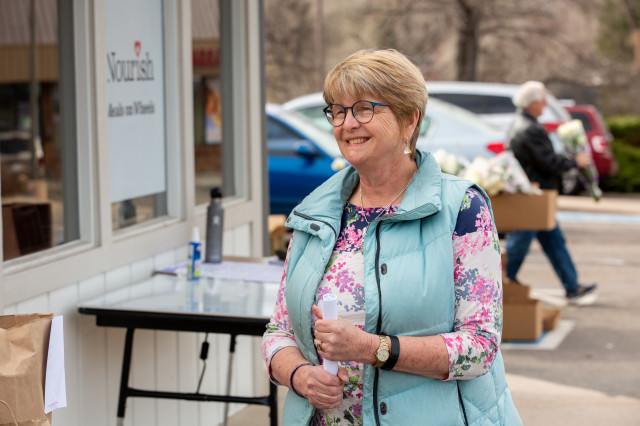
Kathy Kreidler has been a Nourish Meals on Wheels driver for 13 years.
By 9:45 a.m. the meals were stacked by the hundreds on the tables, separated into small, thin brown trays covered with plastic wrap and labeled. They’re counted and recounted, bundled by the dozens into cloth or insulated bags and counted again. Desserts are individually wrapped in small, brown lunch bags that are crumpled and rolled from the top down. Count those, too. Can’t forget the desserts.
Each delivery bag is pinned with a sheet of paper—and brochures for new clients, if there are any—and shuttled out of the kitchen into the parking lot.
“Route 16? Route 16?” Lorie Schlomann calls out to the handful of people either pacing the strip-mall parking lot or dangling their feet over rear bumpers while sitting inside their hatches. They greet each other from roughly 6 feet away.
Schlomann places the bags on a folding table. “Count them again, OK?” she says to the drivers as she points to the bags before she walks back toward the white brick building. She strides past a whiteboard with handwritten numbers on it, in no particular order, and looks at the numbers written by drivers as they arrive at the lot to check off route 16.
“Must be behind in there,” an older man chortles. He’s wearing a thin black jacket, sunglasses, hat, and, importantly, latex gloves. He’s been waiting to deliver his meals longer than usual, but he doesn’t mind—it’s not a normal day anyway.
Today, Nourish Meals on Wheels is delivering almost 1,000 meals across 95 square miles of south suburban Denver. On an average week, Nourish delivers five times a week. It’s not a normal week. The coronavirus blurs today, Wednesday, to Anotherday—the same, but also very different.
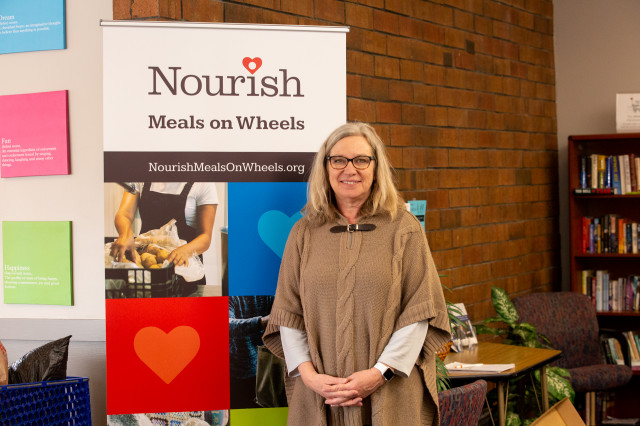
Diane McClymonds is executive director of Nourish Meals on Wheels.
Instead, today is the second delivery of this week with one hot meal, one frozen meal, and one dessert. There’ll be another delivery Friday with more food and maybe two bags of groceries, filled with mostly non-perishable items, for the month. It’ll be the first time that Nourish delivers more than 500 meals. And it’ll start again Monday. Since March, Executive Director Diane McClymonds says the need for Nourish Meals on Wheels has increased 9% and she anticipates the need will go up as the coronavirus spreads.
More than 2,200 meals will go out this week—like almost every week before it—prepared in a kitchen, packaged, counted, counted again, and delivered by six staffers and an army of volunteers. It takes hundreds of thousands of dollars each year to keep Nourish going, supported mostly by community development block grants administered by local governments, individual donations, and corporate sponsors like Subaru.
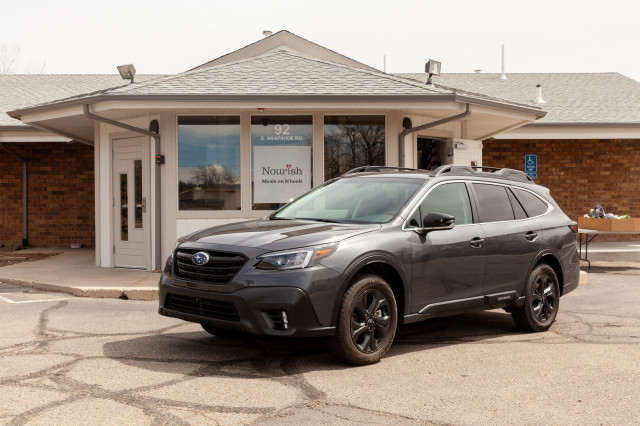
A 2020 Subaru Outback is shown outside of Nourish Meals on Wheels in Englewood, Colorado.
“Subaru has been just great to us,” says Diane, executive director at Nourish.
In 12 years, Subaru has helped deliver more than 2 million meals across the country. In 2017, the automaker donated 50 Outbacks to various Meals on Wheels programs.
“At Subaru of America, we are proud to support causes such as Meals on Wheels America that generate a positive impact in our communities nationwide,” Amy Strawbridge, brand partnerships and experential marketing manager at Subaru, said in a statement. “Meals on Wheels America’s dedication to fighting hunger and isolation among our nation’s homebound seniors is why we at Subaru believe it is critical to raise awareness and fund their mission.”
Meals on Wheels stitches together about 5,000 community organizations like Nourish around the country with more than 2 million volunteers. The group says 9 million seniors around the country are close to hungry—that number is only likely to grow soon as the economy sputters and seniors increasingly rely on more social services.
For many seniors dependent on Meals on Wheels, their delivery drivers are a consistent source of human connection and food. Today, about 30 meals will be delivered in a Subaru. The connection is harder to count.
Kathy counts her meals she’ll deliver to 15 clients today. She’ll make 11 stops in 11.8 miles traveled through the southwestern suburbs near Denver, Littleton, and Englewood. Normally, she says her route takes her about two hours, but today she’s estimating just about 45 minutes to make all her stops along her route: Route W2.
She counts the meals one more time.
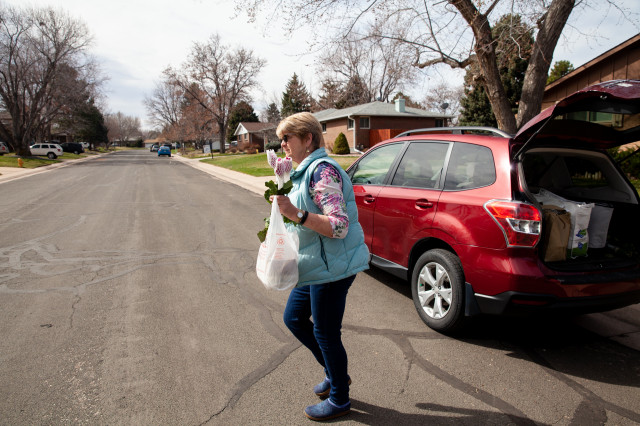
Kathy Kreidler delivers meals in south suburban Denver on April 1, 2020.
Kathy is a Meals on Wheels road warrior in the politest way possible. She’s driven thousands of meals all over town for about 13 years now and she’s been the board chairwoman for the last year. During her tenure on the board, Kathy has helped Nourish move from a nearby Littleton school to their current location—a converted Mexican restaurant with a bigger kitchen than the school and large dining room that they hope to host seniors in one day. There are empty coffee pots, puzzles, books, and tables waiting for that day. The sign outside still says “Las Delicias,” but the lettering underneath asks for non-perishable donations in all caps.
Diane and Kathy say the neighbors around the new home for Nourish have responded—uppercase “R.” Shelves that were near-bare in mid-March are now brimming with canned food that will go out for weekend grocery delivery. Cereal is always in short supply. The pantry always finds a way to deliver what’s needed.
Because Nourish Meals on Wheels isn’t directly tied to federal funding, there are no income restrictions for people who need food. The sole criterion for eligibility is age: 60 years old and older. Presumably, these people are home-bound, or can’t travel on their own. There’s no waiting list for Nourish’s Meals on Wheels program, and no one is turned away. A monthly donation of $ 100 from each recipient is nice, but not all can afford that. Again, no one is turned away.
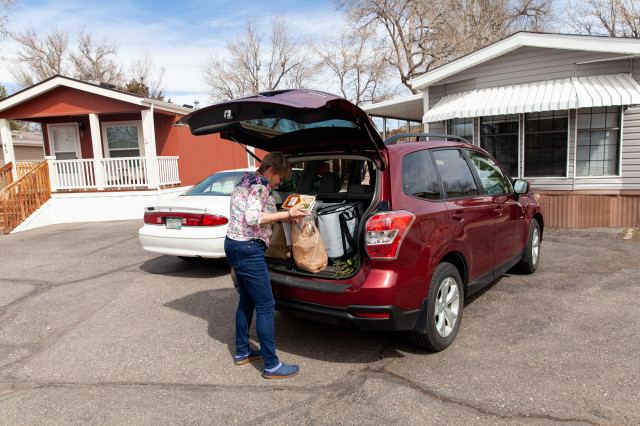
Kathy Kreidler packages a Meals on Wheels delivery April 1, 2020.
Kathy’s route number has stayed the same for all 13 years she’s driven it: W2. Her territory has shifted, some clients have come and gone, but she’s driven the route enough times that even neighbors wave to her. It’s close to her home, in neighborhoods she knows well, and her red 2016 Subaru Forester is plenty big for her three bags.
A former nurse down to her blue-rimmed glasses and practical short brown-blond hair, Kathy’s retirement regimen now includes driving for Meals on Wheels one day a week, among other things.
The stops along her route aren’t just to deliver meals. Kathy sits and talks to some of her clients for as long as she can. Chatting can double—even triple—the usual 45 minutes it should take her to deliver meals, but she does it happily. Her clients became family: John’s birthday is Feb. 14 and he likes cherry pie instead of birthday cake. Rosalee’s from a big Irish family. Patty’s dog, Sammy, must’ve learned a new bark or two.
“They have your heart,” Kathy says.
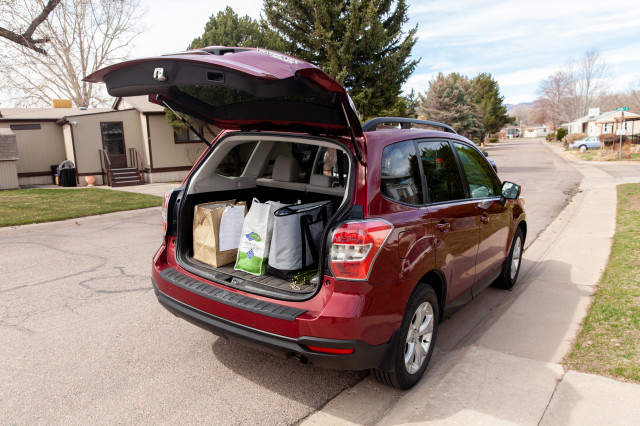
Although coronavirus has made Kathy Kreidler keep her distance, she talks to Meals on Wheels clients as much as she can.
At each stop, Kathy climbs out of her Forester, opens the hatch and prepares each delivery. She moves quickly when she can. She leaves the hatch open when she delivers. One hot meal, one frozen meal for tomorrow, one dessert. Count them again. Sometimes there are special instructions: the food is cut up for people who can’t do it themselves, or green vegetables that can interfere with some blood thinners are cut out. Today, a local florist donated hundreds of flowers for each driver to hand out to clients. Kathy counts three roses and threads them into a plastic grocery bag before she walks to each door. For clients with dogs, Kathy’s pockets are filled with milk bones.
“I have six dogs on my route now, so I burn through them pretty fast,” she says with a smile.
Kathy’s mood is sunnier than her Forester with the sunroof open on this 68-degree, warm April day, and her dangling earrings nod to the breeze. Kathy’s soft speech and bedside manner mark her life as a natural caregiver.
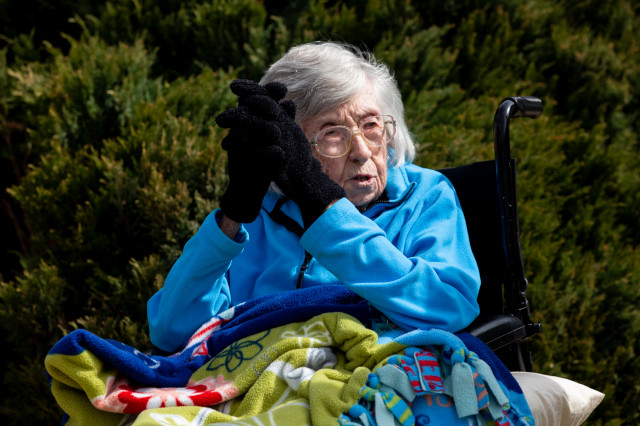
Rosalee Craig is 92 years old and a former school administrator in south Denver.
Rosalee’s home near Littleton is a short walk to St. Mary’s parish and school, where she taught 8th-grade science and was the principal for more than 30 years.
Rosalee is one of 10 children in her family, a typical large post-war Irish Catholic family that moved from the plains of Nebraska to the Rockies in Colorado. Commanding a classroom must’ve been second-nature.
Kathy has delivered meals to Rosalee for more than 10 years now and the two talk like old friends. They are. Rosalee’s Irish Catholic roots come out of her small five-foot frame in a big way; she says she knows when to keep her mouth shut—never when Kathy is around though.
Kathy knows Rosalee’s history like it were her own, her children and grandchildren, pets, and anniversaries. When Kathy delivered Rosalee’s first meal, she remembers Rosalee wore a sweatshirt with “HLS” embroidered on it.
“Those aren’t her initials,” says Kathy. “It was the nickname her husband had for her: Her Little Self.” Rosalee’s nickname for her husband? His Little Self.
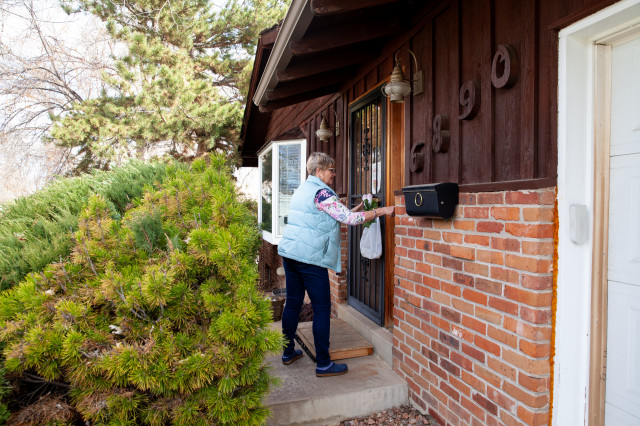
Meals on Wheels
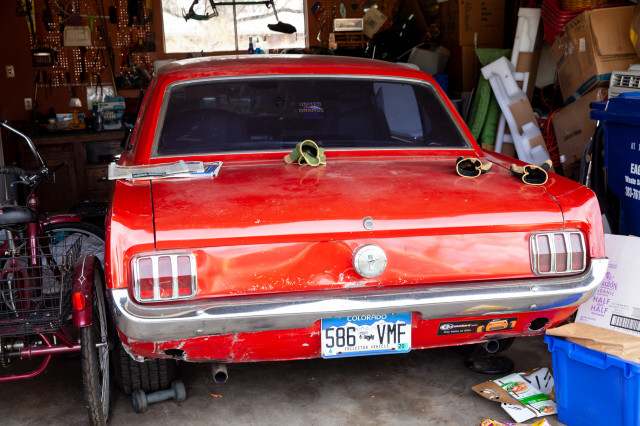
Meals on Wheels
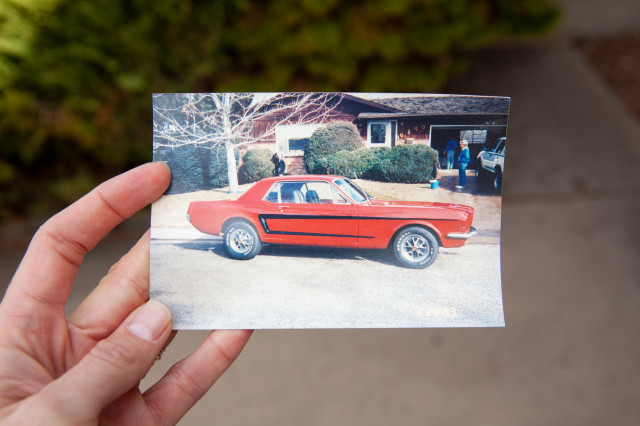
Meals on Wheels
It’s etched in the chimney on Rosalee’s house, exactly where Kathy said it would be. She knows Rosalee’s stories like they were her own.
Despite the physical distance that Kathy keeps from Rosalee now, it’s clear the two are very close. Kathy is that way with all of her clients.
“Sometimes we’re the only people they see. We check in on them, and sometimes we’re the first to know if they’re not OK,” she says.
For some people, Meals on Wheels isn’t just the only food they’ll receive—it’s often the only lifeline.
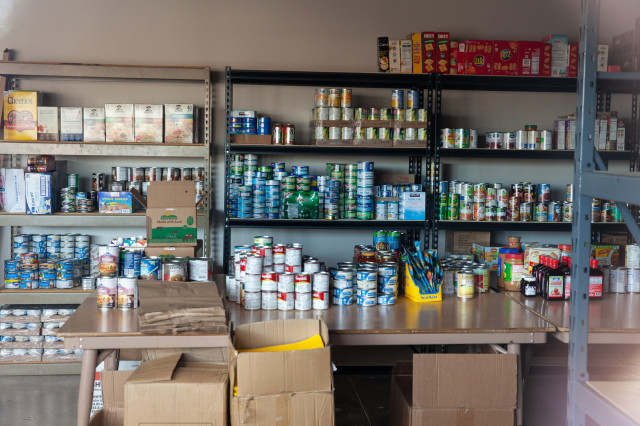
Once near-bare, neighbors have helped Nourish Meals on Wheels during the coronavirus pandemic.
“You know you can call us, right?” Kathy says to John, the second stop of her day.
John isn’t able to travel out of his home often, and his first-floor apartment was flooded about a year ago. The property managers still haven’t fixed the exterior, but Kathy can see through the glass door between them that John’s apartment is in pretty good shape.
Meals on Wheels only packages non-perishable foods in its grocery delivery, which is once a month. Kathy knows John likes yogurt, so she’ll stop at the store to buy him some. It comes out of her pocket.
“Every driver does it,” she says. She stands on the “it” because it isn’t one thing. It’s many things. Too many to count. Kathy can’t buy John’s yogurt today. Not right now, because of the coronavirus, she says. But every driver does “it,” and it is beyond normal duty.
As we wind through the neighborhoods, mostly adult communities of manufactured homes, Kathy dutifully stops half a dozen times more. The routine is almost always the same: park, climb out of her Forester, open the hatch, place her key attached to a green carabiner on the cargo mat, package the meals and walk up to the door. She tucks today’s roses between the knob and door jamb, knocks on the door and walks away with a smile. She reaches in, grabs the carabiner, closes the hatch, and drives away.
Kathy pulls up to her last stop, Patty. The sight of her red Subaru is comfort food like the spaghetti and meatballs, meatloaf and mashed potatoes, or chicken and stuffing that are often requested from Nourish’s clients.

A local florist donated hundreds of flowers for delivery to Meals on Wheels clients.
Patty, who’s sitting on her porch with her dog that she rescued, Sammy, is all smiles to see Kathy. Sammy’s just as excited: Kathy has bones stashed in her pocket. Sammy knows. Across the street from Kathy is a makeshift donation bakery: donated loaves of bread and cakes are scattered on the table for any resident to take.
Kathy and Patty chat about how she’s doing, the sunny weather, and Sammy—always about Sammy. Kathy says she hasn’t seen Patty in about a month, not since her grandchildren visited and Kathy delivered some extra cereal and Pop-Tarts for the kids in the morning because Patty needed them.
After she’s delivered Patty’s food—and bones to Sammy—she turns to me and recalls one conversation she had with Patty, not too long ago.
“She told me that ‘Sometimes we feel invisible,’” Kathy says. Older, home-bound people can feel like they’re never seen, she says. Maybe even forgotten.
They count. Kathy and Meals on Wheels make sure they know that.

